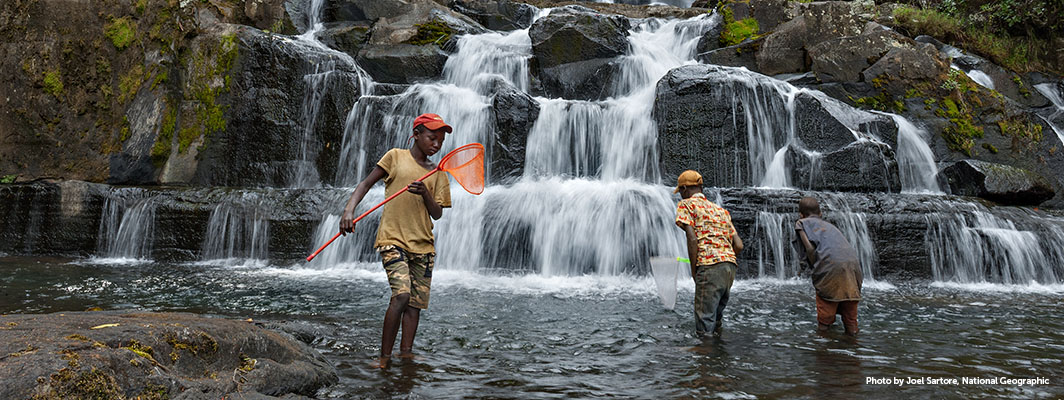
I taught at a small school. I loved my colleagues on my social studies team; we shared resources and supported each other. Still, if I wanted to integrate new ideas into my curriculum, I usually had to do a lot of the heavy lifting myself. I would attend a workshop or read an article on a new teaching technique, and I’d be excited about new ideas, but then struggle to find opportunities and resources to implement them.
A Socratic seminar? Sounds great! Maybe in October.
A historical role-playing activity? Let’s aim for March.
The opportunities would come and go. Sometimes I would share my successes and stumbles with my teammates. Other times, I would stick some student work in my professional portfolio and move on to the next unit.
Teachers everywhere want to innovate and grow, but they do not always have the wrap-around support to help them. At the National Geographic Society, we are building a free collection of tools and resources to help teachers learn more about their practice, connect with like-minded educators, find quality resources for their classrooms, and receive feedback and recognition for their expertise. Our goal in creating this “educator ecosystem” is to support every teacher who wants to help their students develop the mindset of a National Geographic Explorer by teaching about the world, how it works, and how students can make a difference. The micro-credentials we developed with Digital Promise are an integral part of that work.
Micro-credentials are truly authentic professional learning tools. Rather than just giving educators access to information about teaching strategies, micro-credentials help us provide educators with a chance to demonstrate that they can implement those strategies in their classrooms.
National Geographic wants to engage educators who teach about the world, how it works, and how students can make a difference. These topics are not limited to one discipline or grade level. Our first two micro-credential stacks—Geographic Thinking and Service Learning—give teachers from every grade level and discipline opportunities to show how they teach students to analyze the world and how they empower students to make a difference.
Our Geographic Thinking micro-credentials encourage educators across subjects and disciplines to integrate the mindset of a National Geographic Explorer into their teaching. Students view content critically and geographically, asking questions like, “What is it? Why is it there? Why does it matter? What should I do next?” The Geographic Thinking micro-credentials can be earned independently or combined into a stack to support powerful geographic inquiry in the classroom.
Our Service Learning micro-credentials connect educators with processes and resources to integrate authentic community service into their academic curricula. By combining real-world community service with rigorous academic goals, educators can guide engaging and relevant learning experiences for their students.
We hope that teachers who already use these skills view micro-credentials as a chance to get the feedback and recognition they deserve. Teachers who are interested in these topics can use resources, try new ideas, and get suggestions and support.
Our micro-credentials provide an entry point to our National Geographic educator ecosystem. They can also serve as important validation for educators who are growing their teaching practice through our other professional learning resources. The educator ecosystem provides wrap-around support for teachers looking to improve their practice and turbocharge the classroom for their students. Teachers can use our digital Resource Library to find engaging and informative resources for their students. Teachers planning lessons for micro-credential submission can draw on our extensive library for student materials.
Teachers can also join online learning courses to develop their content knowledge, learn new instructional strategies, or even pursue National Geographic Teacher Certification with other teachers from around the country. Most importantly, teachers will soon be able to join the online National Geographic Educator Network. Here, educators can share ideas, celebrate successes, and gain support in their challenges.
A teacher interested in bringing more authentic field research to her eighth-grade life sciences classroom, for instance, might begin by taking our winter 2019 course on Connecting the Geo-Inquiry Process to Your Teaching Practice. She might meet some amazing teachers and continue to discuss and share resources in our online educator community, implement a geo-inquiry project using the Geo-Inquiry Process in the spring, and use her experience with the project to earn the Geographic Thinking micro-credentials in the summer. As she shares her experiences and her micro-credential badges with colleagues in her school and the Educator Network, others will be inspired to learn and grow as well.
Micro-credentials play a critical role in this ecosystem. They help “close the loop” on the teacher experience by giving teachers a chance to demonstrate, share, and celebrate their learning. They can also be a gateway—inviting teachers to step into a diverse community of educators who share their passions.
Start earning micro-credentials today by visiting our website.